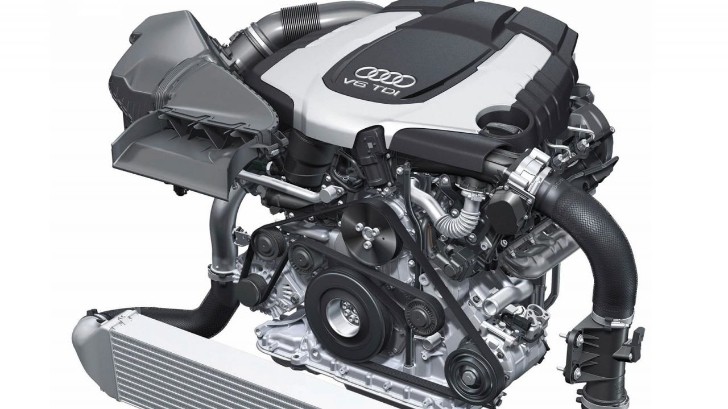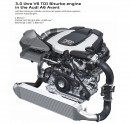It’s now safe to say that we have entered a new era of diesel engine development, where the oil burners have not only evolved from work horses found on utilitarian vehicles to modern, refined, passenger cars, but have also entered the performance segment of the auto industry.
BMW recently launched its tri-turbo 3.0-liter straight six, daring to offer it on M-badged vehicles and it is now time for Audi to make its move. The Ingolstadt brand recently announced a 3.0-liter V6 TDI that uses a biturbo setup to place 313 hp between 3,900-4,500rpm, and 650Nm (479 lb-ft) between 1,450 to 2,800rpm under the driver’s right foot.
The unit also relies on state-of-the-art technology to increase efficiency, such as a start-stop system and a thermal management system that rapidly brings the oil and coolant to their operating temperatures.
The powerplant will debut on the A6 sedan, where, together with an automatic eight-speed tiptronic transmission and Audi’s quattro all-wheel drive system, it manages to push the car past the 62 mph (100 km/h) mark in 5.1 seconds and onto an electronically limited top speed of 155 mph (250 km/h).
The unit will also be offered on the A6 Avant and A7 Sportback, where it offers a 0 to 62 mph (100 km/h) time of 5.3 seconds. At the same time, the unit manages to return an efficiency of 6.4 liters per 100 km (44.1 UK mpg or 36.7 US mpg) and emit 169 grams of CO2 per km.
In addition to that, the 3.0 BiTDI powerplant uses a sound actuator that "transforms the typical TDI exhaust note into a more sonorous roar that is closer to the output of a high-performance petrol engine."
While we’re happy with the new development, we can’t help notice how the VW Group is always late when it comes to diesel engine development - the current biturbo layout comes years after BMW introduced it, just like the entire VW Group switched from duse pump to common-rail diesel injection at a point where most carmakers were using the latter for quite some years.
The two cases aren’t similar, as VW had the ambition to keep developing the duse pump technology on its own back then, while the delay of the biturbo doesn’t have an excuse, but they do show the same tendency.
The unit also relies on state-of-the-art technology to increase efficiency, such as a start-stop system and a thermal management system that rapidly brings the oil and coolant to their operating temperatures.
The powerplant will debut on the A6 sedan, where, together with an automatic eight-speed tiptronic transmission and Audi’s quattro all-wheel drive system, it manages to push the car past the 62 mph (100 km/h) mark in 5.1 seconds and onto an electronically limited top speed of 155 mph (250 km/h).
The unit will also be offered on the A6 Avant and A7 Sportback, where it offers a 0 to 62 mph (100 km/h) time of 5.3 seconds. At the same time, the unit manages to return an efficiency of 6.4 liters per 100 km (44.1 UK mpg or 36.7 US mpg) and emit 169 grams of CO2 per km.
In addition to that, the 3.0 BiTDI powerplant uses a sound actuator that "transforms the typical TDI exhaust note into a more sonorous roar that is closer to the output of a high-performance petrol engine."
While we’re happy with the new development, we can’t help notice how the VW Group is always late when it comes to diesel engine development - the current biturbo layout comes years after BMW introduced it, just like the entire VW Group switched from duse pump to common-rail diesel injection at a point where most carmakers were using the latter for quite some years.
The two cases aren’t similar, as VW had the ambition to keep developing the duse pump technology on its own back then, while the delay of the biturbo doesn’t have an excuse, but they do show the same tendency.




